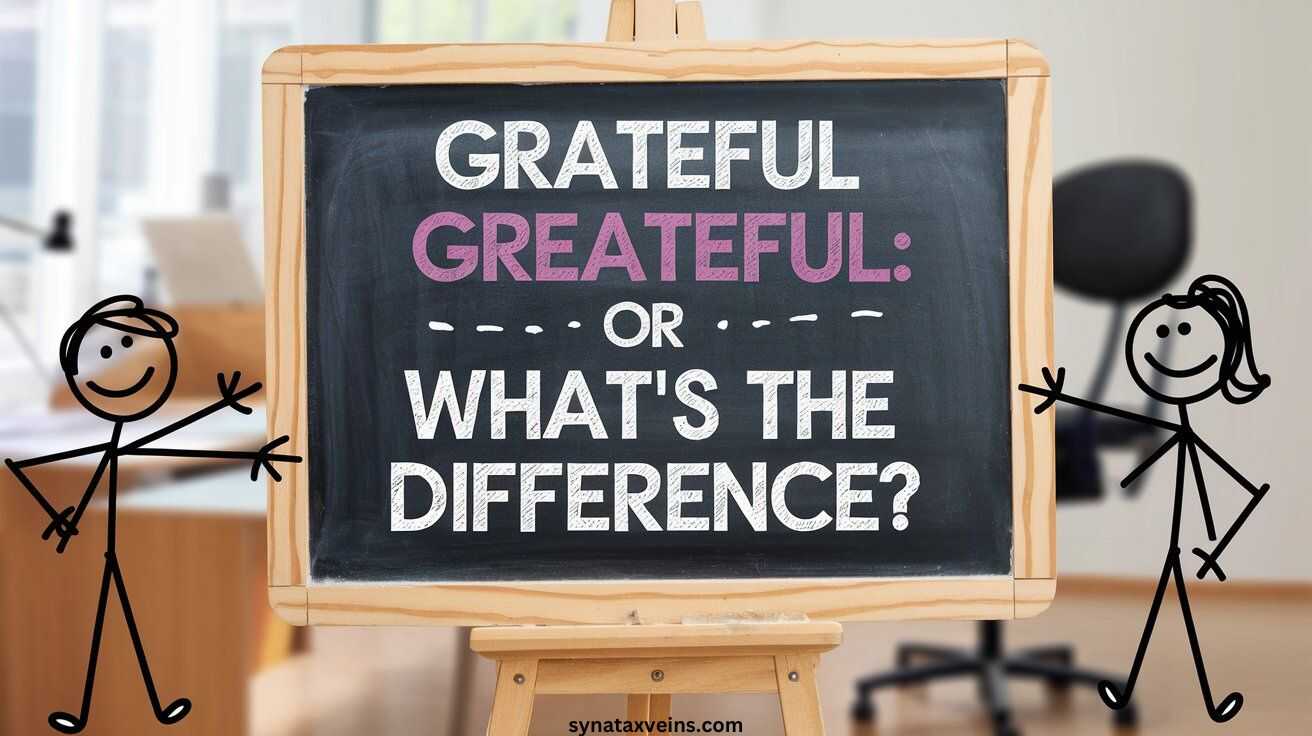Have you ever paused mid-sentence, wondering if it’s grateful or greateful? You’re not alone. This is a common misspelling that trips up many. The correct spelling is grateful, which means feeling or showing appreciation. The word greateful does not exist in English it’s simply a spelling mistake.
If you want to express gratitude properly, understanding the correct spelling and avoiding writing pitfalls is key. This guide will help you master the word’s meaning, avoid common mistakes, and enhance your writing skills.
Understanding Grateful or Greateful
Many confuse grateful with greateful due to phonetic similarity. It’s easy to assume it relates to “great,” but that’s incorrect. The word origin of “grateful” comes from the Latin gratus, meaning “pleasing” or “thankful.”
Incorrectly spelling “grateful” can weaken language accuracy and writing clarity. Whether you’re composing a heartfelt message, a professional email, or an academic essay, mastering proper spelling and avoiding spelling errors will improve your communication skills.
Grateful: Definition and Usage
The definition of grateful refers to feeling or showing appreciation for kindness or something positive. It carries a strong emotional weight and fosters positive sentiment in personal and professional relationships.
Examples:
✅ “I am grateful for your support.”
✅ “She felt deeply grateful for the opportunity.”
✅ “Being grateful can improve your mental well-being.”
5 Synonyms for Grateful
When you want to express appreciation, try these strong vocabulary alternatives:
- Thankful – “I’m truly thankful for your kindness.”
- Appreciative – “He was deeply appreciative of the gesture.”
- Obliged – “I’m much obliged for your help.”
- Indebted – “I feel indebted to those who stood by me.”
- Gratified – “She was gratified by their support.”
Greateful: Definition and Usage
Simply put, greateful is not a word. It’s an incorrect spelling that often results from word confusion. Many people miswrite it due to pronunciation confusion, thinking it’s connected to “great.”
If you’re struggling with spelling accuracy, consider using writing enhancement tools like Grammarly or spell-check features in digital editors.
5 Synonyms for Grateful (Instead of “Greateful”)
To reinforce the proper spelling, here are commonly used synonyms you can use instead of the misspelled word:
- Feeling appreciative
- Demonstrate gratefulness
- Gratitude expression
- Sense of gratitude
- Show thankfulness
Side-by-Side Comparison
| Word | Correct? | Meaning | Usage Example |
|---|---|---|---|
| Grateful | ✅ Yes | Feeling appreciation | “I’m grateful for your kindness.” |
| Greateful | ❌ No | Common misspelling | N/A (not a real word) |
Using the right spelling improves your writing fluency and ensures word correctness in both personal and professional settings.
Everyday Usage Examples
To reinforce better writing skills, here’s how to use grateful naturally:
- Personal gratitude: “I feel incredibly grateful for my family.”
- Professional relationships: “We are grateful for our loyal clients.”
- Social interactions: “I’m grateful for your help today!”
The Role of Gratefulness in Daily Life
Incorporating gratefulness into your daily routine can have a profound impact on your mental well-being, social interactions, and even physical health. Studies show that expressing gratitude strengthens relationships, enhances emotional well-being, and fosters a positive mindset.
Whether through simple gestures, words, or actions, demonstrating gratefulness can improve your communication skills and deepen personal and professional relationships.
READ MORE >>> Heros or Heroes: What’s the Difference Between the Two?
Psychological Benefits
Practicing gratefulness regularly can rewire your brain for positivity. It encourages emotional appreciation, reduces stress, and increases overall life satisfaction. Here are some key mental health benefits of expressing gratitude:
- Stress Reduction: Recognizing the good in life lowers cortisol levels, reducing stress.
- Positive Sentiment: A sense of gratitude enhances optimism and combats negative thoughts.
- Emotional Depth: Being grateful strengthens emotional connections with others, creating meaningful conversations.
- Social Communication: Expressing thankfulness fosters better relationships and human interaction.
- Mental Resilience: People who practice gratitude expression tend to handle adversity better.
Physical Benefits
The impact of gratefulness goes beyond the mind—it influences physical well-being too. Here’s how:
- Improved Sleep: A positive mindset before bed leads to better sleep quality.
- Lower Blood Pressure: Studies link expressing appreciation to lower heart rates and improved cardiovascular health.
- Stronger Immunity: Emotional well-being plays a role in boosting the immune system.
- Reduced Pain Perception: Practicing gratitude and well-being is linked to lower pain sensitivity.
Expressing Gratefulness
Practicing gratefulness can take many forms. Whether through words or actions, acknowledging kindness fosters stronger connections.
Verbal Expressions
A simple “thank you” can go a long way in making someone feel appreciated. Verbal expressions of gratitude improve social interactions and contribute to stronger relationships. Some ways to do this include:
- Saying thanks to family, friends, and colleagues daily.
- Complimenting others genuinely to express appreciation.
- Sharing moments of feeling appreciative during conversations.
Written Expressions
For a more lasting impact, writing is a powerful way to show thankfulness. This helps in both personal connections and professional relationships. Consider these methods:
- Writing thank-you notes to colleagues or loved ones.
- Keeping a gratitude journal to record moments of emotional appreciation.
- Sending emails or texts to demonstrate gratefulness.
Public Acknowledgment
Recognizing someone’s contributions publicly can strengthen workplace appreciation and team collaboration. Examples include:
- Giving a shoutout in a meeting to recognize someone’s efforts.
- Acknowledging teamwork and dedication in front of others.
- Writing a LinkedIn post to appreciate a mentor or colleague.
Acts of Kindness
Sometimes, actions speak louder than words. Expressing gratitude through kindness builds meaningful connections and strengthens bonds. Try:
- Helping a friend or co-worker with a task.
- Surprising someone with a small gift as a gratitude expression.
- Volunteering to give back to the community.
The Importance of Gratefulness in Professional Settings
Incorporating gratitude into workplace culture fosters strong vocabulary around appreciation, enhances communication skills, and builds a supportive environment.
Strengthening Team Cohesion
A team that practices gratitude expression is more engaged, motivated, and cooperative. Benefits include:
- Increased team collaboration and work environment satisfaction.
- Enhanced morale and positive workplace culture.
- Employees feeling valued and recognized for their contributions.
Building Stronger Client Relationships
Gratitude isn’t just valuable internally—it helps businesses build long-term client relationships. Some ways to demonstrate gratefulness in professional settings include:
- Sending thank-you messages to loyal clients.
- Offering loyalty rewards or discounts as a gesture of appreciation.
- Maintaining clear and respectful communication to show acknowledgment of kindness.
By integrating gratefulness into your daily life and professional interactions, you can create stronger relationships, improve mental health, and cultivate a positive impact in both personal and professional spaces. Stay grateful, and watch your connections thrive!
FAQs: Grateful or Greateful?
Is “greateful” a word?
No, it’s a common misspelling of grateful. Always use the correct spelling to maintain language accuracy.
What does “grateful” mean?
The grateful definition is feeling or showing appreciation. It’s an essential part of positive communication and emotional appreciation.
How can I avoid misspelling “grateful”?
- Remember: Grateful comes from gratus, not “great.”
- Use writing improvement tools for spelling accuracy.
- Practice writing grateful in different contexts.
Conclusion
The difference between grateful and greateful is simple one is correct, the other is a typo mistake. Understanding the linguistic origin of words enhances English vocabulary and helps avoid frequent misspellings.
By mastering correct word usage, you improve effective writing, build strong vocabulary, and communicate with confidence. Stay grateful, and keep learning!

